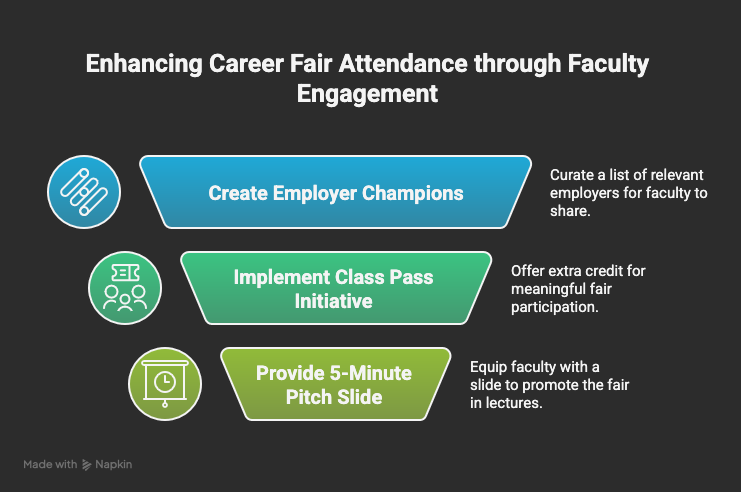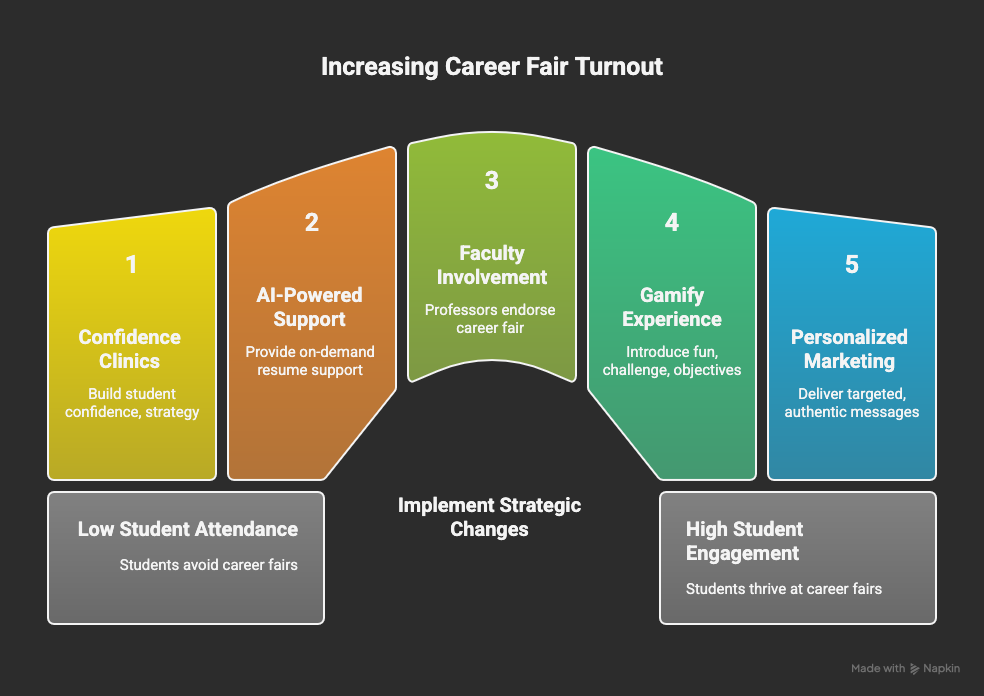How can career centers boost student attendance at career fairs?
Increase turnout by building student confidence through personalized prep, involving faculty as advocates, and adding gamified, interactive elements that make career fairs engaging and less intimidating.
You've booked the space, courted the employers, and sent the mass emails.
But when the doors to the career fair open, you're met with a trickle of students instead of a flood.
It's a frustratingly common story for Career Services Professionals, and the old playbook of free pens and pizza isn't enough for Gen Z.
Read on to see how top career centers are changing the game by helping students feel ready, involving faculty, and adding interactive, personalized elements that turn attendance into genuine engagement.
How Can Pre-Fair Prep Drastically Increase Turnout?
By making students feel confident and prepared. A primary reason students skip career fairs is a lack of confidence in their own materials and ability to navigate the event.
They're not just avoiding a fair; they're avoiding the feeling of being judged and found wanting.
Students who feel their resume, LinkedIn profile, and elevator pitch are ready are far more likely to attend.
In fact, a lack of preparedness is a top driver of career fair anxiety, which is a significant barrier to attendance. When students feel competent, they see the fair as an opportunity, not a threat.
According to a research by ResearchGate and a case study by University of Wisconsin-Madison, first-generation and underrepresented students often face limited social capital, unclear career processes, and low confidence that discourage participation in employer events.
Both self-reported studies and institutional case analyses show that uncertainty about how to approach recruiters or what’s expected frequently hinders engagement.
Actionable Strategies
- Host "Confidence Clinics," Not Resume Reviews: Rebrand your prep sessions. Instead of just "Resume Reviews," host "Confidence Clinics" or "Career Fair Game Plan" workshops. Focus on building a strategy: how to approach a recruiter, what questions to ask, and how to follow up. Frame it around empowerment.
- Scale Preparation with AI: For every student who visits your office, ten more don't. Implement AI-powered tools to provide on-demand support. This allows students to iterate on their resume privately until they feel confident.
- Leverage Peer-to-Peer Power: Students often trust their peers as much as, if not more than, staff. Create a "Career Ambassador" program with trained upperclassmen. The University of Pennsylvania’s Peer Career Advisor program is a great model where students can get quick, low-stakes advice from fellow students, making the prep process far less intimidating.
Also Read: 6 ways to supercharge your career center administration.
What Is the Most Untapped Resource for Driving Attendance?
Your faculty. Professors are the single most influential figures in a student's academic life, and their endorsement carries immense weight.
Students consistently report that a strong relationship with a professor is critical to their success.
When a professor recommends attending the career fair, it’s not just another marketing email; it's a trusted academic advisor signaling a valuable opportunity.
The Gallup-Purdue Index has repeatedly shown that students who had a professor who cared about them as a person and made them excited about learning were more likely to be engaged at work and thrive in their post-graduate life.
Tapping into this relationship is key.
Actionable Strategies
- Create Faculty "Employer Champions": Don't just send faculty a list of employers. Do the work for them. Email department heads with a curated list of 3-5 companies attending the fair that are a perfect fit for their students. Include job titles, required skills, and the names of alumni recruiters at the booth. Ask them to share this targeted list with their classes.
- The "Class Pass" Initiative: Partner with faculty in key departments to offer a small amount of extra credit for attending the fair. Create a "Class Pass" that students must get signed by two or three relevant employers after having a meaningful conversation. This structured task gives them a clear goal, reducing anxiety and incentivizing participation beyond just showing up.
- Provide a "5-Minute Pitch" Slide: Create a single, data-rich PowerPoint slide for professors to drop into their lectures the week of the fair. The slide should include the date/time and a QR code to the list of employers.
Also Read: How to measure the impact of career treks on student outcomes?

How Can You Make a Career Fair Feel Less Intimidating?
Gamify the experience. For a generation raised on apps and interactive entertainment, a traditional career fair can feel static and overwhelming.
Gamification introduces elements of fun, challenge, and clear objectives, which can transform a student's perception of the event.
In fact studies show that gamification can improve user engagement by 48%.
Instead of a daunting hall of tables, the fair becomes a quest with achievable goals and rewards. This structure is especially helpful for first- and second-year students who may not be seeking an immediate job but can benefit from exploration.
Actionable Strategies
- Launch a "Career Fair Passport" Challenge: Give each student a "passport" booklet or a digital version within your career services app (like Handshake or Symplicity). To complete the passport, they must get a stamp or QR code scan from employers in different "zones" (e.g., a tech company, a non-profit, a government agency). Completed passports are entered into a raffle for high-value prizes like an iPad, noise-canceling headphones, or lunch with a top local CEO.
- Use a Live Leaderboard: Project a live leaderboard that tracks student check-ins with employers via the event app. This creates a sense of friendly competition and event buzz. You can award prizes to the students who connect with the most employers.
- Create "Conversation Starter" Cards: At the check-in desk, provide students with a small card featuring three interesting, non-generic questions to ask recruiters (e.g., "What's a challenge your team is currently working to solve?" or "What's the most surprising thing about your company's culture?"). This simple tool can be a lifeline for a nervous student.
Also Read: How to boost student engagement in career treks?
Are Your Marketing Messages Actually Being Heard?
Probably not, if they're generic. Students, particularly from Gen Z, have a finely tuned filter for impersonal, corporate-style communication.
They crave authenticity and personalization. A single email blast to all students with a PDF of 100+ employers is likely to be ignored.
To break through the noise, you need to deliver the right information to the right students on the right platform.
Actionable Strategies
- Segment Your Email Lists Aggressively: Stop sending a single list of employers to everyone. Create targeted campaigns. Send business majors a list of the top 10 finance and consulting firms attending. Send computer science majors a list of the top 10 tech companies. In the email, highlight specific roles they're hiring for and mention if any alumni work there.
- Run "Alumni Takeovers" on Social Media: Partner with young alumni who work at some of the top companies attending the fair. Have them do an Instagram or TikTok "takeover" on the university's career services account for a day. They can share a "day in the life," offer tips for talking to their company's recruiters, and answer student questions live. This provides a credible, authentic preview of the employers.
- Text Message Reminders with a Call to Action: On the morning of the fair, send a text message reminder. But don't just state the time and place. Include a value proposition and a clear call to action. For example: "The career fair is happening now! Google, Deloitte, and 80+ other employers are hiring [Student's Major] majors in the Grand Hall until 4 PM. See the full list here: [link]." Studies show SMS messages have a 98% open rate, making them far more effective for last-minute reminders than email, with an open rate of 26.8%.
Also Read: How to stretch your career center budget?

Wrapping Up
Career fairs are no longer just about logistics, they’re about readiness, confidence, and connection. The more students feel prepared, the more they show up and engage meaningfully with employers.
That’s exactly where AI-powered support like Hiration come in.
By helping students perfect their resumes, practice interviews, and polish LinkedIn profiles on demand, Hiration enables career centers to scale personalized preparation - so when fair day arrives, students don’t just attend; they thrive.
With no setup fees and a free pilot, it’s easy to explore. Book a personalized demo today to see it in action.
Student Attendance at Career Fairs - FAQ
Why do students skip career fairs?
Lack of confidence and uncertainty about what to say or how to approach recruiters deter attendance. First-generation and underrepresented students often face limited social capital, unclear processes, and low confidence that hinder engagement.
How does pre-fair preparation increase turnout?
Preparation reframes the event from threat to opportunity. When resumes, LinkedIn profiles, and elevator pitches feel ready, anxiety drops and students are more likely to show up and engage meaningfully with employers.
What pre-fair strategies work best?
Run “Confidence Clinics” focused on approach, questions, and follow-up; scale on-demand prep with AI so students iterate privately; and use peer advisors so students get quick, low-stakes feedback from trained upperclassmen.
How can faculty drive higher attendance?
Faculty endorsements carry outsized weight. Equip professors with curated employer lists aligned to their majors, offer a “Class Pass” extra-credit check-in task, and share a single slide with date, time, and QR to employers.
How to make a career fair feel less intimidating?
Gamify it. Clear objectives, quests, and rewards turn a static hall into an interactive experience, especially for earlier-year students who benefit from exploration without immediate job pressure.
What gamification tactics are effective?
Use a “Passport” challenge across employer zones, a live leaderboard of check-ins to create buzz, and conversation-starter cards at check-in so nervous students have specific, credible questions ready for recruiters.
Which marketing messages actually cut through?
Segment by major and send targeted employer lists with relevant roles; run alumni social takeovers for authentic previews; and deliver platform-native content students trust over generic, one-size-fits-all blasts.
What’s the most effective last-minute reminder channel?
Text messaging. SMS has a 98% open rate, far higher than typical email open rates like 26.8%, making it ideal for day-of reminders with a clear value proposition and link to the employer list.
How can first-gen and underrepresented students be better supported?
Clarify expectations and lower the social-capital barrier: provide step-by-step approaches, scripted starter questions, peer advising access, and structured tasks like the Class Pass to guide purposeful employer conversations.
What’s the core playbook to boost attendance fast?
Combine confidence-building prep, faculty activation with targeted employer alignment, and gamified, interactive elements; then amplify with segmented outreach and SMS reminders to convert interest into on-site engagement.



